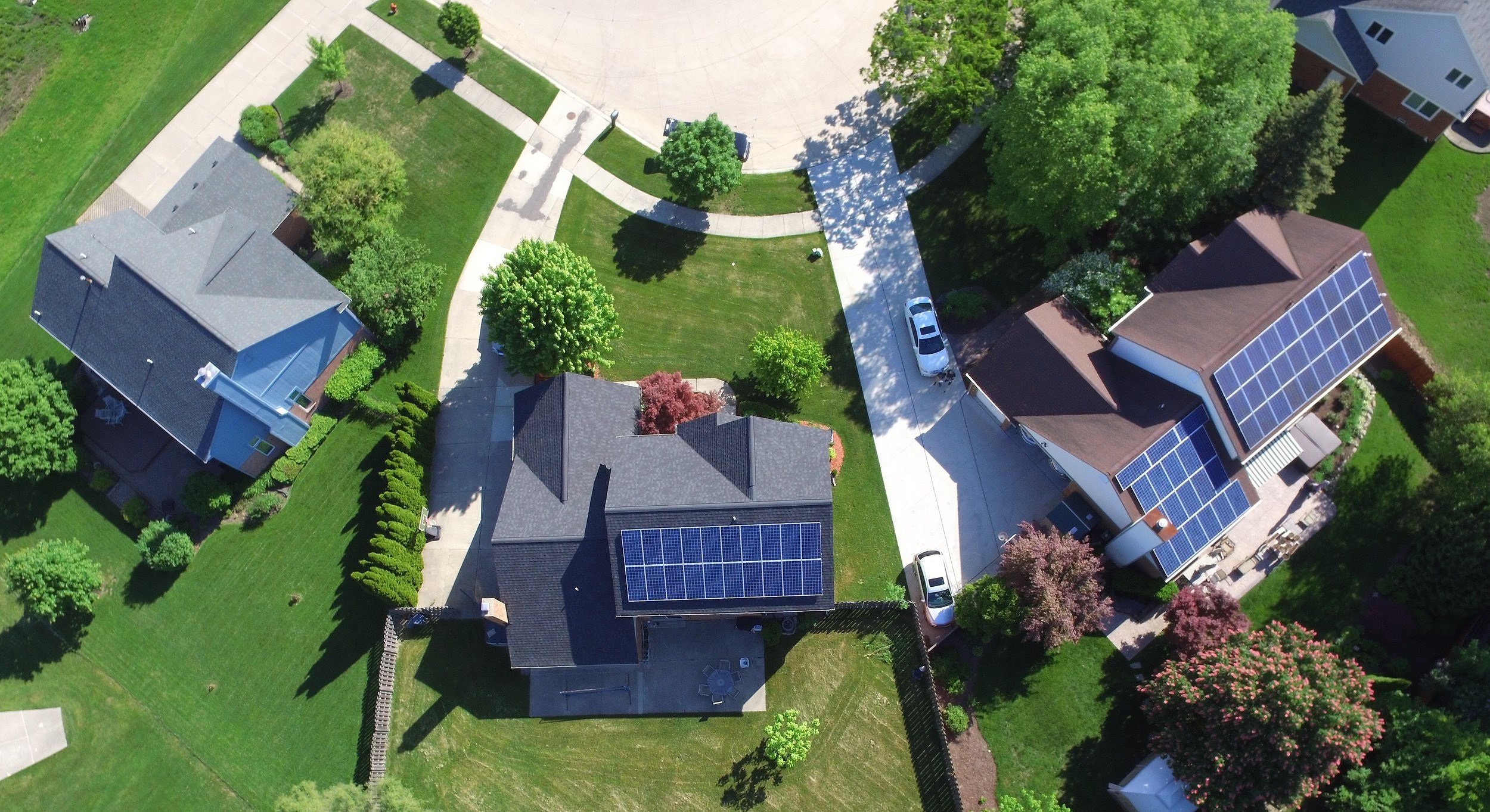Homeowners across Michigan are asking a simple question before they buy solar: will this improve my home’s resale value? The short answer is yes for most solar systems, and the long answer depends on a few practical choices you make up front. This guide explains how value shows up at resale, what affects it, and how to set yourself up for the best outcome.
Key Points
- Owned systems typically command a resale premium and faster sales; leases/PPAs can limit buyers and add friction.
- Buyers pay for lower bills, resilience/modernization, and sustainability; batteries/EV chargers/smart panels can boost appeal for the right buyers.
- Value depends on ownership status, system age/performance, local rates/policies, and documentation quality (production data, bills, warranties, clear MLS details).
- In Michigan, rising electricity costs and growing familiarity with solar support higher demand and stronger outcomes when listings are well presented.
- Think two streams of value: monthly utility savings while you live there plus a potential sale premium.
Get a FREE solar installation quote
Start today and boost your home resale value!
Why Buyers Pay More for Homes With Solar Installed
- Lower monthly costs. A buyer who can see past utility bills and a production record understands the savings they are purchasing along with the home.
- Energy resilience and modernization. Solar, and optionally batteries or smart panels, signal a modern, efficient home with more control over energy use.
- Sustainability appeal. Many buyers value reduced carbon footprint and are willing to pay a bit more for homes that align with those values.
- Perceived upkeep advantages. We use certified expert system designers, high quality equipment, and have a 10 year workmanship warranty on top of manufacturer warranties.
How Much Can Solar Increase Home Value?
Market studies and our personal experience with customers have consistently shown a meaningful premium for homes with solar power, whether that is grid-tied panels, battery storage solutions, EV chargers, or other solar energy solutions. The size of that premium depends on factors like system ownership, age and performance, local power rates, and how well the solar value is documented during the sale.
In neighborhoods with frequent outages, home solar battery storage can be a real selling point by providing backup power. A dedicated EV charger and a smart electrical panel help a home feel modern and move-in ready.
In Michigan, rising electricity costs and growing awareness of solar have supported buyer interest. Well-presented systems often help homes sell for more and faster. Adoption is expanding across Michigan and buyers are becoming more familiar with the benefits of solar energy.
Clarity and thoroughness of the listing is crucial. When a listing clearly communicates ownership status, warranty details, and verified savings, interest tends to increase. However, if a listing prompts more questions than answers, it can be intimidating or confusing for potential buyers.
Home Value Impact Example
Scenario A: 6 kW system, 5-year horizon
- Installed cost after incentives: $12,600
- Bill savings: $1,200 per year
- Five-year savings: ~$6,000
- Home price at sale: $350,000
- Resale premium at 4%: ~$14,000
- Total impact over 5 years: ~$20,000 in combined savings and potential premium
These examples are for illustration only. Actual outcomes depend on system size, energy use, local rates, and market conditions.
This example shows how value appears from two directions: monthly bill savings while you live in the home, and a potential premium when you sell. The key is system ownership and clear documentation.
Factors That Impact Home Value
Ownership Structure
- Owned (cash or loan): Generally delivers the strongest resale benefit because buyers get the asset and the savings with no third-party obligations.
- Loans with UCC-1 filings: Check whether your lender filed a UCC-1 on the equipment. Plan for payoff or a lien release before listing so buyer financing stays smooth.
- Leases and PPAs: These can narrow the buyer pool and add assumption steps that slow closing. If resale value is a top priority, ownership is usually the cleaner path.
What this means at resale: keep proof of ownership, warranty documents, and any payoff/release letters in a simple folder to share with your agent and the appraiser.
It’s important to match financing to your timeline. If you expect to sell in under 3 years, pick terms that allow a clean exit. If you plan to stay 7 years or longer, more affordable ownership‑friendly financing helps you capture both savings and resale benefits.
System Quality & Design
- Equipment: Reputable panel and inverter brands, right-sized system, and strong product/performance warranties.
- Inverter architecture: Microinverters or optimizers enable module-level monitoring and can help with shade management and troubleshooting.
- Workmanship & aesthetics: All-black modules (where appropriate), low-profile racking, concealed conduit, and a tidy, symmetrical array make a better impression.
- Monitoring: Easy access to production data builds buyer confidence and supports appraisal.
Production & Age
- Right-sizing: Designs based on your historical kWh usage are easier for buyers and appraisers to value.
- Orientation/tilt & shading: South-facing, minimal shading, and smart layout raise production potential.
- Age & degradation: Newer systems with plenty of warranty runway are more attractive; note the commissioning date and any service records.
- Performance history: Annual production reports or utility bill summaries help quantify savings.
Market & Policy Context
- Utility rates: Higher or rising rates increase the value of your savings to buyers.
- Net metering/credit programs: Local export credit rules affect savings and whether benefits transfer to a new owner.
- Local norms & incentives: Familiar agents/appraisers and available incentives can bolster perceived value.
- Listing practices: Use MLS fields to mark ownership status, system size, year installed, and transferable warranties; avoid overstating savings.
Capturing the Value at Appraisal and Sale
Providing the right information up front makes it easier for an appraiser to recognize the system’s value. Ask your agent to share a completed Residential Green and Energy Efficient Addendum along with recent production data and utility bills. Clear, verifiable numbers help the appraiser connect performance to market value.
Buyers appreciate a simple solar packet they can review before making an offer. Include permits, as-built drawings, equipment and workmanship warranties, interconnection approval, monitoring reports, and a brief summary of recent bills. Organized documents reduce uncertainty and build confidence.
Accuracy on the MLS home listing also matters. Indicate if the system is owned, list the system size (kW) and installation year, and mention any transferable warranties. Keep savings claims conservative and tied to documentation so lenders and buyers can validate them easily.
Finally, plan the handoff before closing. Decide how you’ll transfer monitoring access, provide any warranty transfer forms, and share interconnection documentation so the new owner can take over without friction.
Property Taxes, Policy, and Local Programs
Local ordinances, policies, and tax implications can be tricky. When you install solar with Strawberry Solar, we will guide you through the process and answer any questions that you have, as many of these aspects vary by city or county.
Some of the important things to consider include:
- Some places exclude certain renewable upgrades from assessments, others don’t. Check with your local assessor.
- Utilities also differ in how they credit excess energy. Ask how net-metering or bill-credit benefits transfer to a new owner so there are no surprises at closing.
Solar vs. Other Home Improvements
Before investing in upgrades, many homeowners wonder how solar compares to other common projects like kitchens, roofs, or HVAC systems. While each has its place, solar is unique in that it offers both monthly savings and a potential resale boost when documented well. Here’s how it stacks up against other improvements buyers frequently consider.
It’s helpful to use three lenses when deciding what to do first: cash flow, resale signal, and timing.
| Project | What buyers notice | Cash‑flow effect | Typical resale impact | Pro tip for sellers |
|---|---|---|---|---|
| Owned solar energy system | Lower electric bills, modern tech | Lowers utility costs | Medium to high when owned and well documented | Keep production data, warranties, and clear proof of ownership |
| Roof replacement | Condition and insurability | None directly | Medium via condition and deal certainty | If the roof is aging, do this before solar and coordinate mounts/warranties |
| HVAC upgrade (high‑efficiency/heat pump) | Comfort and efficiency | Can reduce heating/cooling costs | Medium; modern systems attract buyers | Share efficiency ratings and recent bill history |
| EV charger (Level 2) | Daily convenience for EVs | None | Low to medium; depends heavily on the buyer | List amperage, location, and compatibility in the MLS |
| Kitchen or bath remodel | Clean, move‑in ready look | None | Medium if neutral and tasteful | Favor broad appeal over trendy finishes |
(General guidance for Michigan homes. Actual results vary by scope and market.)
When another project should come first
- Roof near end of life. Curling shingles, leaks, or brittle underlayment.
- Electrical issues. Undersized service, frequent breaker trips, or safety hazards.
- Water intrusion or structural concerns. Moisture, grading, ventilation, or foundation problems.
Fixing these protects appraisal and insurability – solar will land better afterward.
If the roof and essentials are in good shape, owned solar is one of the few projects that can help today’s budget and tomorrow’s sale. Document ownership, performance, and warranties so buyers and appraisers can see the value.
Why Choose Strawberry Solar

Local design expertise: We know Michigan roofs, weather, and utility rules, and we design clean systems that look good and perform well.
Ownership‑friendly guidance: We are an authorized Michigan Saves contractor and can help you choose financing that keeps resale value in mind.
Strong warranties and monitoring: We offer trusted equipment, workmanship coverage, and system monitoring so you can easily document performance.
Documentation you will actually use: We assemble permits, as‑builts, warranty details, and a simple performance summary so you are prepared for appraisal and sale later on.
Get a FREE solar installation quote
Start today and boost your home resale value!
Frequently Asked Questions About Solar’s Impact on Home Value (FAQs)
In Michigan, rooftop solar is generally exempt from adding to your taxable value. The state reinstated a solar property-tax exemption in 2019, so even if solar raises your market value, your property taxes should still reflect the pre-solar value. Always confirm with your local assessor.
Often, yes – especially if you’ll use the energy savings during that time and your buyers value low bills. You can also benefit from the federal 30% Residential Clean Energy Credit if you act before the end of 2025, which currently applies to systems placed in service through 2032 (then steps down), but check current IRS guidance before you commit.
If the roof is near end-of-life, consider re-roofing first and install solar once the new roof is on. That avoids paying to remove and reinstall panels later and makes your listing cleaner when you sell.
They can, when the system is owned. Appraisers and lenders may include contributory value for owned or fixture-to-real-estate systems, following standard appraisal requirements. Third-party-owned (leased/PPA) systems generally cannot be included in the appraised value.
Not necessarily, but it adds steps. Buyers typically must assume the lease or you may need to buy it out; many lenders won’t allow leased systems to be counted in value. Plan for extra disclosures and timing during escrow.
It can boost appeal, especially in outage-prone areas, because buyers value backup power. Appraisers may consider an owned battery’s contributory value where the local market supports it, but data and treatment vary by market, so think of batteries as a livability/ resilience upgrade first.
Stick to verifiable documents and clear assumptions:
- Share 12 months of utility bills (pre- and post-solar) and your monitoring reports.
- Note your utility’s credit/tariff rules and that savings vary with usage, seasons, rates, and weather. Michigan’s regulator explicitly cautions that savings estimates are just estimates and can vary widely.
- If credits transfer to the new owner under your utility’s distributed-generation program (Michigan replaced traditional net metering with DG), include that info and any utility documentation.


